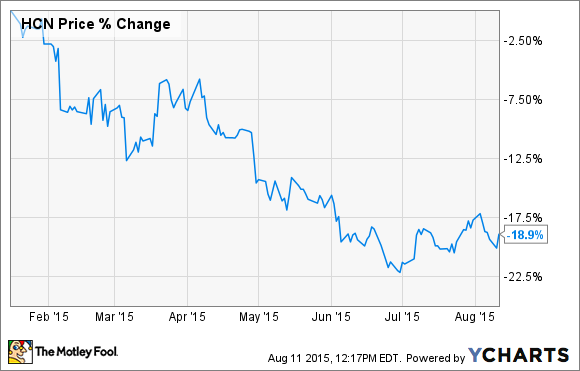Investing in real estate investment trusts, or REITs, that own properties can be an excellent way to achieve a combination of income and growth in your portfolio. While there are many types of equity REITs -- most of which can make solid long-term investments -- there are some that have particularly strong growth potential over the next few decades. Here are three types of REITs that I feel are excellent opportunities right now, as well as the best companies to capitalize on them.
An aging population and fragmented industry
The population is aging. In fact, the number of people age 75 and up is expected to nearly double by 2035, a growth rate five times that of the overall population. One way to capitalize on this trend is with a REIT specializing in healthcare properties.

Source: Health Care REIT.
My favorite REIT in the business is Health Care REIT (HCN 0.21%), which owns nearly 1,400 properties, most of which are senior housing (63% of the portfolio) or long-term-care facilities (21%). The company's properties are newer and better occupied and generate more revenue than the industry average, and its size and financial strength give it the freedom to pursue any attractive opportunities that come up.
Another advantage is that Health Care REIT has strong relationships with some of the best healthcare property operators in the business, such as Genesis Healthcare, Brookdale Senior Living, and Brandywine Senior Living. In fact, about four-fifths of Health Care REIT's investments are made alongside existing partners.
A disciplined growth model, high-quality properties, and favorable demographic trends have allowed Health Care REIT to deliver 15.6% average annual returns since its inception in 1970. And with shares down nearly 19% since the January highs, now may be a good opportunity to get in.
The biggest player in a rapidly growing type of real estate
There is no doubt about it – the need to store data is growing rapidly. According to Cisco, data center IP traffic will nearly triple between 2013 and 2018.
One REIT, Digital Realty Trust (DLR 0.27%) is capitalizing on this trend by acquiring and developing innovative data centers and leasing the space to tech heavyweights such as IBM, Facebook, and AT&T. Digital Realty's main avenue of growth has historically been through developing new properties, but it is known to make acquisitions when opportunities come up.
For instance, Digital Realty recently agreed to acquire data-center operator Telx. Not only does Digital Realty already own almost one third of Telx's data-center square footage which creates synergy opportunities, but many of Telx's properties are significantly under-occupied. Digital Realty's size, credit, and experience, as well as the rapidly growing demand, will ensure there is no shortage of opportunities to grow in the future.
Over the past decade, Digital Realty has used the momentum in the industry to produce 18.7% average annual total returns, as well as 14% average dividend increases. And since the increasing need for data centers doesn't look like it's going to end anytime soon, it should be able to deliver strong returns for years to come.

Source: Digital Realty Trust
A new kind of residential REIT
SilverBay Realty Trust (NYSE: SBY) is a new REIT, formed in 2012 with the goal of taking advantage of opportunities in the single-family housing market.
The strategy here is quite simple -- acquire single-family homes in certain markets at a discount to their replacement cost, create value through light rehab and renovation work, and use the growing demand for quality rental properties to generate income.
Most of SilverBay's properties are concentrated in markets that haven't fully recovered from the financial crisis, such as Tampa and Orlando, Florida, whose home values are still 33% and 37% below their pre-crash peaks. This allows SilverBay to obtain attractive deals on properties, as evidenced by the fact that the company's average cost basis in each of its properties is $141,000, but the average property is worth $161,000 and has a replacement cost of $207,000. In other words, SilverBay has been able to acquire its properties for 32% less than it would cost to build them.

Source: SilverBay investor presentation.
Unlike the other two, SilverBay doesn't have a long-established history of delivering returns, so it's arguably the most speculative of the three at this point. However, the early results look promising. SilverBay has managed to sustain a 95% occupancy rate and retains about 80% of its residents upon lease expiration. As of the second-quarter earnings report, net interest margins are up, FFO has climbed nicely, and the company just increased its dividend.
On top of the promising results, the stock looks cheap right now. SilverBay's net asset value climbed 6% to $21.34 over the past year, but shares trade for nearly 25% less than that amount.
Some risks, but fantastic reward potential
Finally, it's important to mention that just like every other stock in the market, these REITs are not without risks. For example, all are highly dependent on a single type of property. If the single-family housing market takes a nosedive like it did a few years ago, SilverBay's net asset value could get crushed. And if the demand for data-storage solutions drops unexpectedly, Digital Realty's profits would probably drop with it.
Both of these are unlikely scenarios in my opinion, but they're certainly possible. My point is that there are risks, but the long-term reward potential of these REITs more than makes up for it, and any one of these three companies could be an excellent wealth-creating asset in your portfolio for years to come.






